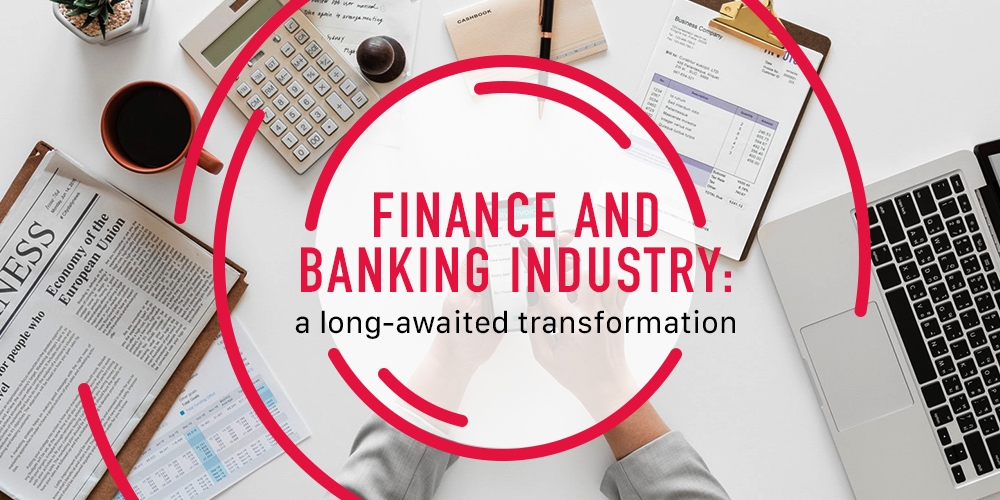Finance and banking are one of the oldest industries in the world and are well-known for their legacy methods and “classic” approach towards business operations. But, as the world becomes digitized, more and more industries ramp up their processes in order to keep up with the changes.
Time has come for the banks and financial institutions to adopt innovation and handle some of the processes over to the technologies like artificial intelligence. So what will innovative tools bring to the industry and how they will impact the state of finance and banking?
Problems of the past that still exist in the present

The biggest problem that the financial industry faced was the overwhelming amount of paperwork and information to deal with. The second problem was the incredibly high possibility of a human error during the information processing.
The introduction of computers and Information Technology into the world of finance freed the industry professionals from monotonous tasks and allowed them to focus on things that demanded a high level of accuracy and attention. But this digitization is not the main point here.
If we look at credit scoring, we’ll see that the majority of lending companies still utilize the logistic regression method to assess the borrower. And this is the rusted nut in a smooth mechanism of the financial industry.
Logistic regression has always been considered the “golden rule” of scoring as it offered an accurate and fast estimation of the borrowers. However, with the rise of Big Data and growing data complexity, logistic regression is not a de-facto standard anymore.
While outperforming people in scoring models accuracy, the method of logistic regression has its flaws. The biggest one is the inability of the method to use “raw” data: i.e. with missing values or non-numerical data. In order for the model to use such data, it first has to be processed by a person.
So, while logistic regression builds accurate scoring models, it’s still rather time-consuming. In addition, concerns have been raised about the dependency between the borrowers’ credibility and the information used for assessment. Lenders have been using traditional information for ages and it includes information about gender, marital status, income, etc. But does it reflect the real state of things and guarantees the credit repayment? Not so much.
How artificial intelligence boosted lending
Since traditional information about borrowers is not enough and the influx of the available data is growing, lenders are coming up with new ways to obtain and analyze the data. And with the help of artificial intelligence, they stepped up their game.
 Machine learning, an AI subset, is capable of determining hidden patterns in the data and identifying the non-obvious dependencies. In addition, machine learning makes use of data from social networks or data that seemed irrelevant decades ago. And don’t forget its ability to process huge volumes of information and handle the Big Data seamlessly!
Machine learning, an AI subset, is capable of determining hidden patterns in the data and identifying the non-obvious dependencies. In addition, machine learning makes use of data from social networks or data that seemed irrelevant decades ago. And don’t forget its ability to process huge volumes of information and handle the Big Data seamlessly!
While many lenders still hesitate to trust the machines with the assessment of the borrowers, this method has already proved to be much more accurate than logistic regression. As well, some of the solutions offered today are able to independently process raw data and then analyze it. That means, no need in professionals to pre-process the data: the technology is responsible for all process, from the very beginning till the end. And this is a really important and time-saving factor.
Robotic financial consultants and more
Lending is not the only branch of financial industry that has been transformed with technology. The financial industry overall is becoming more open towards innovation and embraces it, creating an effective combination of time proved methods and cutting-edge tools.
Risk management
Predictive analytics plays a huge role in banking and finances as it allows to build forecasts for future growth, development strategies and more. Based on the forecast accuracy, financial institutions can either gain or lose huge amounts of money – so it’s crucial to find an efficient tool that would minimize possible errors.
Machine learning can process Big Data, find hidden dependencies and build strong predictive models. No wonder it’s being steadily deployed into financial processes – it provides specialists with valuable insights and accurate future forecasts.
Virtual assistants and chatbots
Chatbots are seeing huge popularity in the last few years and there is a reason for that. They are time-saving, offer a personalized experience and navigate the user through the website/app easily. A lot of companies from various industries have implemented chatbots on their websites and time has come for banks and financial institutions to follow the lead.
In addition to chatbots, a few financial institutions have already implemented the full-fledged virtual assistants within their website. These personalized bots are powered by machine learning and can help you perform simple financial transactions or advise on financial issues.
All hail the blockchain

One of the most talked about trends of the recent years is blockchain that gained immense popularity and is applied in a variety of industries, with finances being the primary one. The Global Fintech Report estimates that by 2020, 77% of fintech institutions will adopt the blockchain technology within their processes.
One of the biggest names in global banking, JP Morgan Chase has already started to use the blockchain technology. The bank launched a new division called Quorum that would be responsible for research on blockchain and its further implementation. And this is not the only example. Bank of America and Goldman Sachs – these banks also followed the lead and entrusted blockchain with their processes. So does this technology bring real benefit to financial institutions?
The biggest advantages of blockchain for the financial industry are:
- Reduced fraud
Since the system is decentralized, it becomes much more difficult to breach and hack it. Even if one block is hacked, it would be easy to track it down since all blocks are linked. As well, the financial records are visible to all people who take part in a transaction, which is another point in favor of blockchain.
- Better customer experience
As Forbes claims, a research by KPMG estimates that blockchain will raise customer experience by 25%. All thanks to faster operations and data processing, compared with the outdated methods that are currently used in the majority of financial institutions.
- Trade finance
With blockchain, all involved parties will share the information about the transaction and will be added to a certain network. And, as soon as the transaction conditions are met, the system will independently execute the contracts, with all the actions being transparent for the users.
- Increased efficiency
Blockchain technology overall can contribute greatly to increasing the performance efficiency for banks and financial institutions. First, it can eliminate a great deal of paperwork that companies still struggle with. Secondly, transactions will be performed much faster because the system will be responsible for carrying them out and will be reliable enough to trust it. Finally, blockchain offers enhanced security, which is crucial for any financial company.
Yes, blockchain seems like a universal remedy – but do you really need it? You can check out a report by KPMG that helps business owners estimate whether their company really needs to adopt a blockchain technology or can do without it.
Final thought
As Nick Larson (BDM at LexisNexis Risk Solutions) said, “If banks are less able to differentiate a risky borrower from a non-risky borrower, lenders and servicers have to hedge for that risk. As a result, lenders will have to charge higher interest rates across the board. Overall, consumers actually get hurt”. This is a perfect reflection of an idea that any change, adopted by a bank/financial institution, has to first and foremost benefit the customer.
With the world being digitized and customers expecting better and faster service, it is time for the financial companies to follow along. Of course, there is no need to rush for any cutting-edge technology just for the sake of it, but if it proves to be beneficial and contributes to overall efficiency and security, there is little to no reason for taking a second guess.
At DashBouquet, we have experience in developing apps for the financial industry and we can provide you testimonials from satisfied clients on the quality of our work. We understand that the world of finance stands no flaws so we are ready to deliver the highest quality so your customers enjoy your services and you enjoy the increase of their loyalty.



